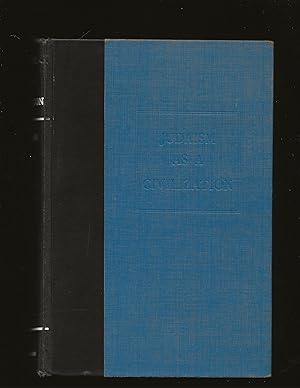Beschreibung
1957 Enlarged Edition. Signed and inscribed by the author on the first front end paper (see photo). The inscription reads: 'To Emmanuel + Minnie Halperin with the compliments of Mordecai M. Kaplan, April 29, 1957.' This book is in very solid condition. The covers are very clean. They do have some wear, a 1/2" tear off the top edge of the spine along with a crease and little fraying at the top edge. At the bottom edge of the spine there are a couple of very small spots of rubbing. Off the top edge of the rear cover there is a light crease. The top edges each have a few spots of light rubbing. There is light rubbing on both bottom edges and a few spots on the rear middle edge. There is rub-through at all four corners. The page edges look very good. The middle page edge is deckled or rough-cut-cut. They did an excellent job. The book is square and the spine is straight. The binding is very solid from cover to cover with nicely tight pages throughout and nicely tight covers as well. With a 601 page heavy book that is no small thing. The interior of the book is in excellent condition. The pages have the slight toning that would be expected, but they are exceptionally clean. Scrolling through, I haven't found any instances of soiling. And surprisingly, I haven't found any conspicuous creasing, no turned-down corners or placeholder creases. There are no markings in the book. No attachments of any kind. And with the exception of the author's signed inscription, no one has written their name or anything else anywhere. 'Mordecai Menahem Kaplan was a Lithuanian-born American rabbi, writer, Jewish educator, professor, theologian, philosopher, activist, and religious leader who founded the Reconstructionist branch of Judaism along with his son-in-law Ira Eisenstein. He has been described as a 'towering figure' in the recent history of Judaism for his influential work in adapting it to modern society, contending that Judaism should be a unifying and creative force by stressing the cultural and historical character of the religion as well as theological doctrine. From 1934 until 1970 Kaplan wrote a series of books in which he expressed his Reconstructionist ideology, which was an attempt to adapt Judaism to modern-day realities that Kaplan believed created the necessity for a new conception of God. His basic ideology was first defined in his 1934 work Judaism as a Civilization: Toward the Reconstruction of American-Jewish Life. Kaplan saw his ideology as a 'school of thought' rather than a separate denomination, and in fact resisted pressure to turn it into one, fearing that it might further fragment the American Jewish community, and hoping that his ideas could be applied to all denominations. Kaplan's theology held that, in light of the advances in philosophy, science, and history, it would be impossible for modern Jews to continue to adhere to many of Judaism's traditional theological claims. Kaplan's naturalistic theology has been seen as a variant of John Dewey's philosophy. Dewey's naturalism combined atheism with religious terminology in order to construct a religiously satisfying philosophy for those who had lost faith in traditional religion. Kaplan was also influenced by Émile Durkheim's argument that our experience of the sacred is a function of social solidarity. Matthew Arnold and Hermann Cohen were among his other influences. In agreement with prominent medieval Jewish thinkers including Maimonides, Kaplan affirmed that God is not personal, and that all anthropomorphic descriptions of God are, at best, imperfect metaphors. Kaplan's theology went beyond this to claim that God is the sum of all natural processes that allow man to become self-fulfilled.'. Bestandsnummer des Verkäufers 004725
Verkäufer kontaktieren
Diesen Artikel melden
![]()




